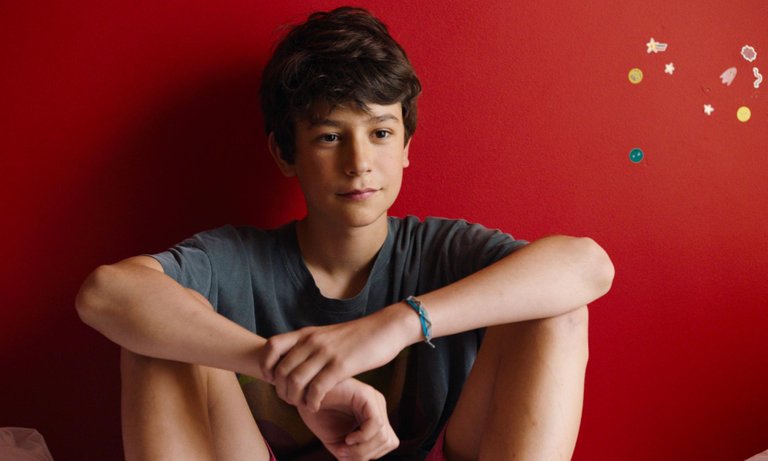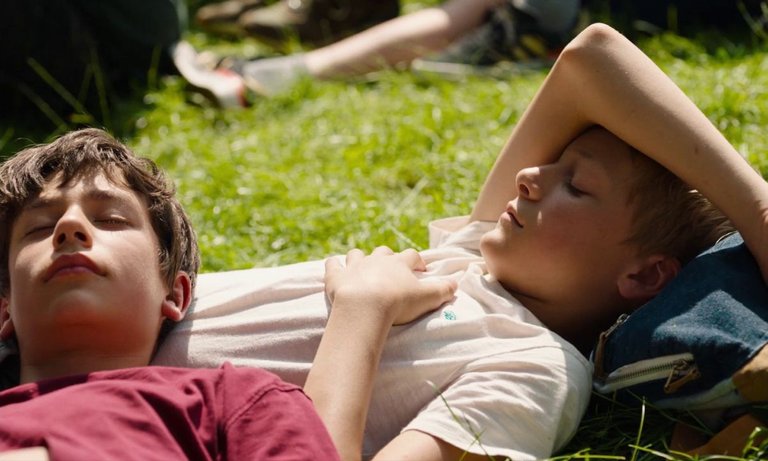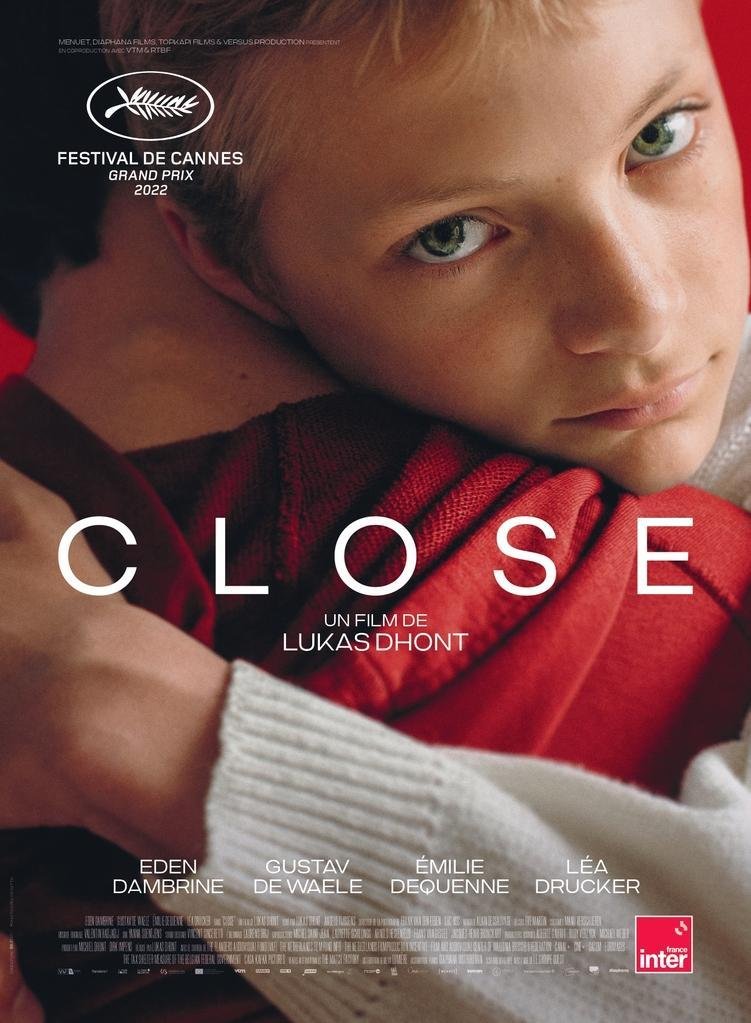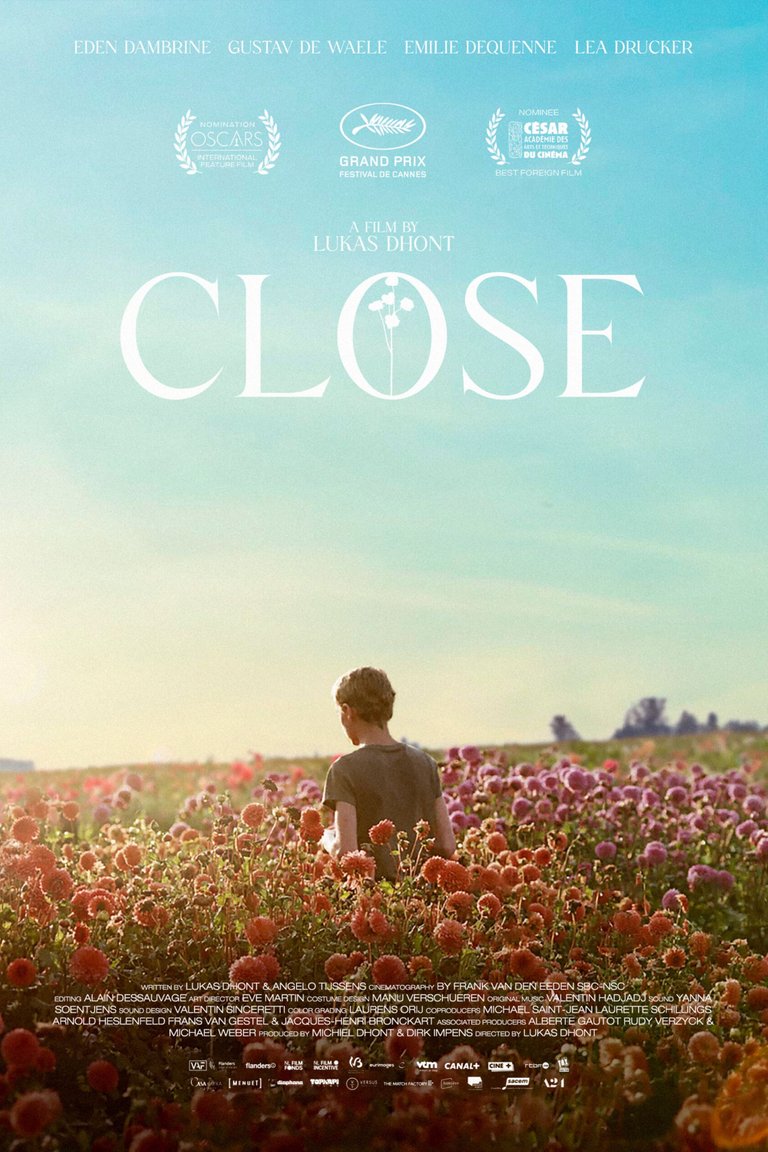Close (2022): innocence, guilt and homophobia | inocencia, culpa y homofobia

Obtuvo el Gran Premio del Jurado en el Festival de Cannes
Surely you remember that this film was nominated in the last edition of the Academy Awards in the category of Best International Film. I couldn't see it before the ceremony, but I did see it later when it was available on MUBI and although a few months have passed since then, I'm bringing it to the platform today because this was a review that I had to upload at the time.
Seguramente recordarán que esta película estuvo nominada en la última edición de los premios de la academia en la categoría de Mejor Película Internacional. No pude verla antes de la ceremonia, pero sí luego cuando estuvo disponible en MUBI y aunque han pasado algunos meses desde entonces, la traigo hoy a la plataforma porque esta fue una reseña que me quedó pendiente subir en el momento.
Close is a Belgian film directed by Lukas Dhont and written by himself together with Angelo Tijssens, which tells the story of two thirteen-year-old boys, Léo and Rémi, lifelong inseparable friends who start to face a series of situations that shake that friendship. In the new year, the children begin to talk and share with their peers and although before they did everything together, little by little they begin to distance themselves partly because some of their classmates question the type of friendship that Léo and Rémi have. It is necessary to say that, within their innocence, children can be somewhat hurtful and also prejudiced. On the other hand, nowadays there is a greater openness regarding certain topics and although before it would have been inconceivable to listen to children of that age talking about homosexuality, nowadays it is something almost normal. So we are not surprised when the boys' classmates ask them if they are dating, to which Léo responds with a resounding negative and to separate himself from that image that others have of him, he begins to share more with them and less with Rémi and tries to integrate into the group, even if it means getting away from his friend, whose presence around him seems to tarnish his reputation.
Close es una película belga dirigida por Lukas Dhont y escrita por él mismo junto a Angelo Tijssens, en donde se cuenta la historia de dos niños de trece años, Léo y Rémi, amigos inseparables de toda la vida que comienzan a enfrentarse a una serie de situaciones que hacen tambalear esa amistad. En el nuevo curso, los niños comienzan a conversar y a compartir con sus semejantes y aunque antes hacían todo juntos, poco a poco comienzan a alejarse en parte debido a que algunos de sus compañeros cuestionan el tipo de amistad que tienen Léo y Rémi. Es necesario decir que, dentro de su inocencia, los niños pueden ser algo hirientes y también prejuiciosos. Por otro lado, en los tiempos de hoy hay una mayor apertura respecto a ciertos temas y aunque antes hubiera sido inconcebible escuchar a niños de esa edad hablando de homosexualidad, hoy en día es algo casi normal. Así que no nos sorprende cuando los compañeros de clases de los chicos les preguntan si son novios, a lo que Léo responde con una cotundente negativa y para separarse de esa imagen que tienen los demás de él, comienza a compartir más con ellos y menos con Rémi e intenta integrarse al grupo, aunque ello signifique alejarse de su amigo, cuya presencia cerca de él parece empañar su reputación.

We must always bear in mind that these are children, adolescents who are growing up and who are unaware of many things about their environment and about themselves. In addition, they do not yet have the emotional maturity or the clarity of identity necessary to know themselves and talk to each other and with others about these issues. Their reactions often seem impulsive and emotional to us, but we cannot condemn them for it.
Hay que tener siempre presente que se trata de niños, adolescentes que están creciendo y que desconocen muchas cosas de su entorno y de sí mismos. Además, aún no tienen la madurez emocional o la claridad de identidad necesarias para auto conocerse y conversar entre sí y con los demás sobre estos temas. Sus reacciones, muchas veces, nos parecen impulsivas y emocionales, pero no podemos condenarles por ello.
The story touches on many themes, but the central one is male friendship, especially at a young age. The culture of machismo has caused misogynistic behavior and a lack of opportunities for women, but it has also brought negative consequences for men themselves. Today, there are still cultures that teach their children that boys don't cry, they are criticized if they are too sensitive or if they are too in touch with their feelings, they are told that they are a bit effeminate, is fragility exclusively feminine then? ? Can't a man verbally and physically show love to another man without his masculinity being called into question? That is the weight that falls on Léo's shoulders, who does not want to be rejected as effeminate and therefore rejects Rémi himself: his friend is a mirror that shows him his own image, the one that others reject. What I regretted in the situation - not as part of the film - was that the children did not speak clearly about what was happening to them, but it is obvious that due to age, maturity and perhaps also pride they never communicated with total honesty.
La historia toca muchos temas, pero el central es la amistad masculina, sobre todo a temprana edad. La cultura del machismo ha provocado conductas misóginas y falta de oportunidades para las mujeres, pero también ha traído consecuecias negativas sobre los mismos hombres. Hoy en día, aún hay culturas que enseñan a sus niños que los hombres no lloran, se les critica si son demasiado sensibles o si están muy en contacto con sus sentimientos se les dice que son un poco afeminados, ¿la fragilidad es exclusivamente femenina entonces? ¿no puede un hombre demostrar amor verbal y físicamente a otro hombre sin que su masculinidad sea puesta en entredicho? Ese es el peso que recae sobre los hombros de Léo, quien no quiere ser rechazado por afeminado y por eso rechaza él mismo a Rémi: su amigo es un espejo que le muestra su propia imagen, esa que los demás rechazan. Lo que lamenté en la situación - no como parte de la película - fue que los niños no hablaran claramente de lo que les pasaba, pero es obvio que por temas de edad, madurez y tal vez también orgullo nunca se comunicaron con total honestidad.

But the break in the friendship of the protagonists is even more painful when tragedy reaches them and from then on the film is - for one of them - a whirlwind of doubts, guilt, fears, resentment and confusion. Close is a very emotional, thoughtful film, with excellent cinematography and excellent performances. Its message is also important and one of the things I enjoyed the most about this film is that despite dealing with sensitive and controversial issues, it does so in a modest, serious, simple way. It would have been easier to make a more direct film about homophobia, but it is precisely this way of dealing with the subject, with some ambiguous scenes and a lot of silence, that makes the film echo well beyond the final credits. Close is available to watch on MUBI, have any of you seen it? what did you think? I read you in the comments.
Pero el quiebre de la amistad de los protagonistas es aún más doloroso cuando la tragedia los alcanza y a partir de allí la película es - para uno de ellos - un torbellino de dudas, culpa, temores, rencores y confusión. Close es una película muy emotiva, reflexiva, con una excelente fotografía y excelentes actuaciones. Su mensaje también es importante y una de las cosas que más disfruté de esta cinta es que a pesar de tratar temas delicados y polémicos lo hace de forma modesta, seria, sencilla. Habría sido más fácil hacer una película más directa sobre la homofobia, pero es precisamente esta forma de tratar el tema, con algunas escenas ambiguas y con muchísimos silencios, lo que hace que el eco de la película resuene mucho más allá de los créditos finales. Close está disponible para ver en MUBI, ¿alguno de ustedes la ha visto? ¿qué les pareció? Los leo en los comentarios.
Reviewed by | Reseñado por @cristiancaicedo
Other posts that may interest you | Otros posts que pueden interesarte:
  |
|---|



It is known that boys are referred to as stronger vessel and they should not be seen as weaklings so this part of movie for the young guy shows how easy for kids to be easily manipulated i guess so. which cause break in the relationship of the two young guys due to what people say.
It is so actually and many times we're not aware of that when we're growing up. Luckily for us, people talk about that a little more now than before. Greetings.
Interesante está trama cinematográfica, no es menos cierto que a veces el machismo y el qué dirán rompe lazos entre amigos, muy bonita tu reseña. Saludos y feliz día .
Muchas gracias por leerme y comentar. Saludos.
Que esperas para unirte a nuestro trail de curación y formar parte del "proyecto CAPYBARAEXCHANGE", tu casa de cambio, rapida, confiable y segura
Se muestra por lo que lo la realidad de la vida de una adolescente. El tema de la aceptación y rechazo. Sucede en la vida real, se busca ser aceptado para evitar el acoso y desde ese momento se corre el riesgo de baja autoestima y falta de personalidad. Muchos temas como dices... No la he visto @cristiancaicedo pero me interesó esta cinta. Gracias por traerla hasta acá.
Si, a pesar de estar circunscrita a un par de niños de otra sociedad en este tiempo, creo que toca temas universales y eso la hace más memorable. Saludos y gracias por leerme.
La verdad es que no he tenido la oportunidad de ver este film, sin embargo llama mi atención por la historia, y todo los temas que nos comentas que podemos ver cómo la amistad entre ambos jóvenes y ese torbellino de emociones por el que pasa uno de ellos. Gracias por la recomendación!
Gracias a ti por la lectura. Espero puedas verla pronto. Saludos.